With the popularity of grain-free diets, you may be worried if you’re feeding your cat the right food for them. Or, maybe you want to feed them a new treat and are wondering, can cats eat corn?
Cats can eat corn, and it’s actually a staple in most cat foods. Corn contains protein fiber, vitamin C, magnesium, and other important nutrients for your cat’s health. However, cats shouldn’t eat corn with salt and butter, seasoned corn, or processed foods that contain corn.
In this article, we’ll discuss eight things to know about cats and corn, from whether they can eat it to how to prepare it for your kitty.
#1: Cats Can Eat Corn!
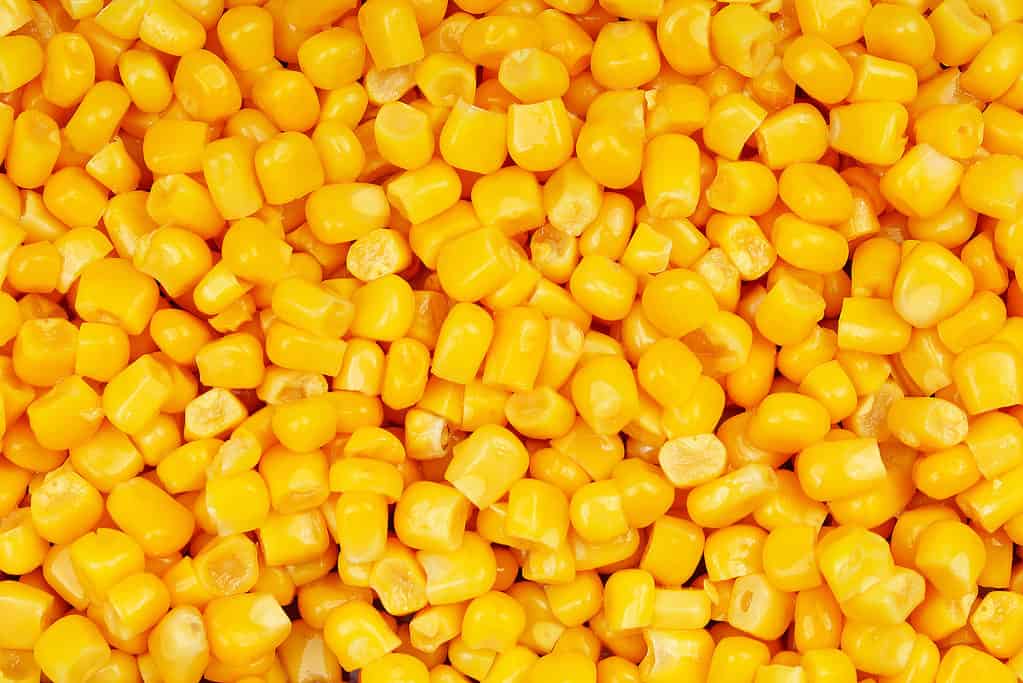
Plain corn off the cob is safe for cats to eat.
©Nalaphotos/Shutterstock.com
Corn is a staple in many cat foods, and cats can eat corn! However, you may not want to give them much extra since it’s already in their diet.
Corn is used as a cheap way to give your cat fiber, essential vitamins, and nutrients, and a sense of fullness.
Unseasoned sweet corn is fine for cats to eat in moderation, though you don’t want to share an entire can with them or anything like that!
#2: Some Cats Like Plain Corn
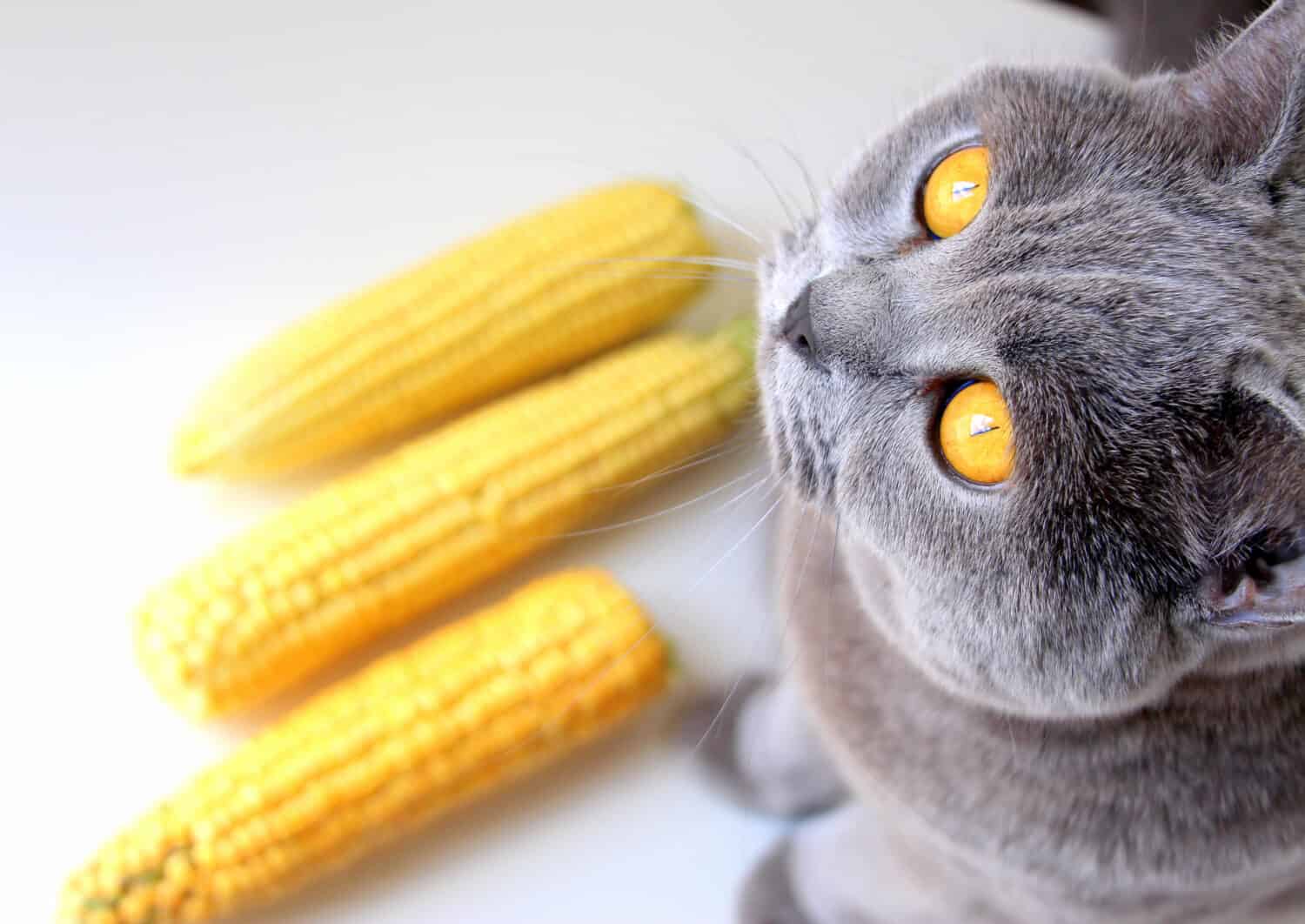
Some cats will eat sweet corn as a treat!
©Sagittarius_13/Shutterstock.com
You may wonder, if cats are meant to be carnivores, why do they like corn? Maybe they beg for your sweet corn, corn on the cob, or popcorn.
Although it seems odd, some cats just have a taste for “human foods” that most cats wouldn’t opt for. They likely enjoy the taste, or they might be curious when they see you eating it and want to try a bite.
There’s nothing wrong with giving your cat plain corn, but avoid corn cobs and processed foods like popcorn.
#3: Pros and Cons of Corn for Cats
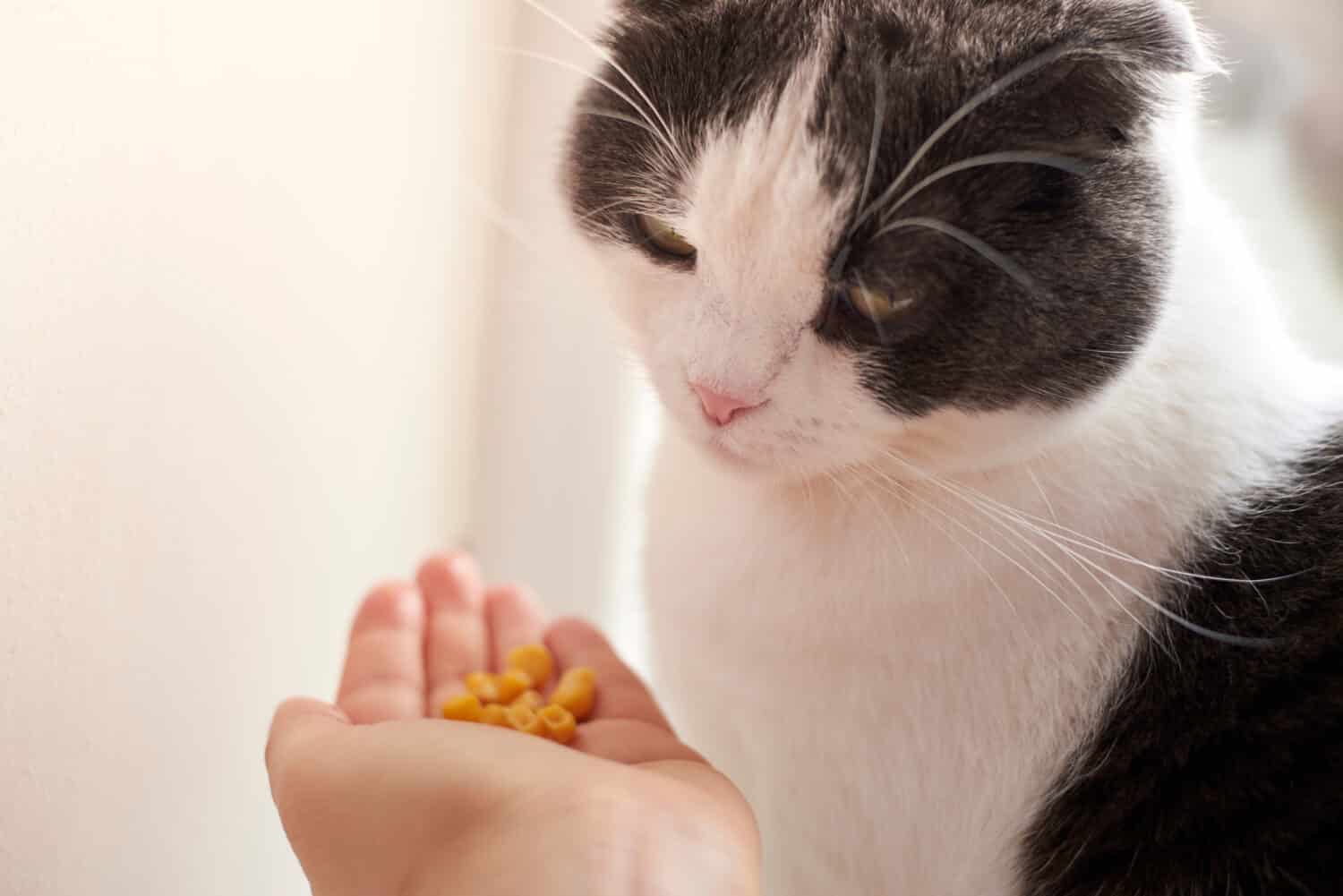
Corn contains essential vitamins and nutrients and is included in many cat foods.
©osobystist/Shutterstock.com
| Pros | Cons |
| Provides many essential vitamins and minerals, including vitamin C, magnesium, and iron | Corn husks can cause choking or intestinal blockages |
| A good source of fiber, aiding in digestion | Most processed human foods that include corn aren’t good for cats |
| Provides added protein to cat food | Too much corn may lead to stomach upset |
| Promotes better eye health | Cooked corn with salt, butter, or other additives and seasonings can hurt cats |
Corn is used in cat food for good reason: it provides them with many essential nutrients. It’s also true that it’s a cheap way to get these nutrients in the amounts our cats need, which keeps cat foods affordable for the average person.
The fiber in corn can help cats’ digestive health, and vitamin C helps the body with growth and healing. Magnesium helps to give cats energy, and iron helps their bodies to circulate oxygen.
Lutein and zeaxanthin are two nutrients found in corn that can support cats’ eye health by lowering their risk of cataracts and protecting their eyes from the sun.
Lastly, corn contains protein, which cats need a lot of! As obligate carnivores, they require a higher percentage of protein in their diet than dogs or people.
Of course, there are also some cons to corn, especially when not fed correctly. Corn cobs can be broken apart and choked on, and they can cause intestinal blockages if pieces are swallowed.
Adding other ingredients to corn, such as butter, salt, or seasonings, can make cats sick. So can processed human foods that contain corn. And too much corn can upset your kitty’s stomach.
#4: Cats Cannot Eat Corn Husks
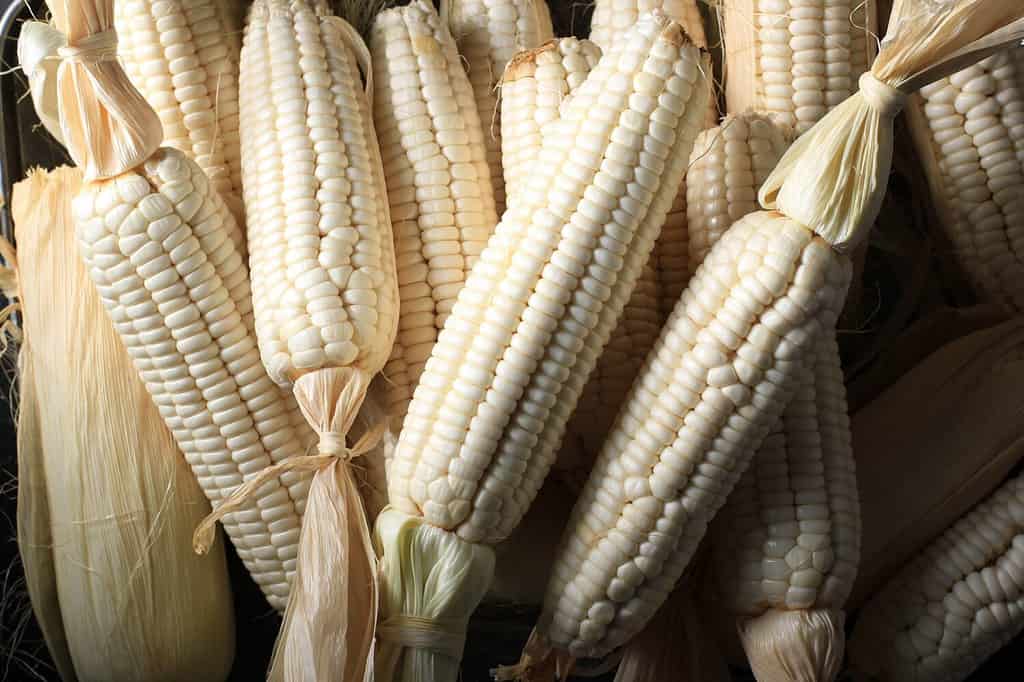
Corn husks can cause choking or intestinal blockages.
©Ika Rahma H/Shutterstock.com
While cats can eat loose corn just fine, they shouldn’t be offered corn on the cob. Corn cobs can cause choking and intestinal blockages.
Luckily, there isn’t a high risk of your cat swallowing a corn cob whole as you might see in a large dog. However, it’s still possible for them to bite off chunks of the cob.
The simplest solution is to scrape the corn off the cob before feeding or to buy loose corn from the start if you’d like to save yourself the effort.
#5: Don’t Feed them Processed Human Food with Corn
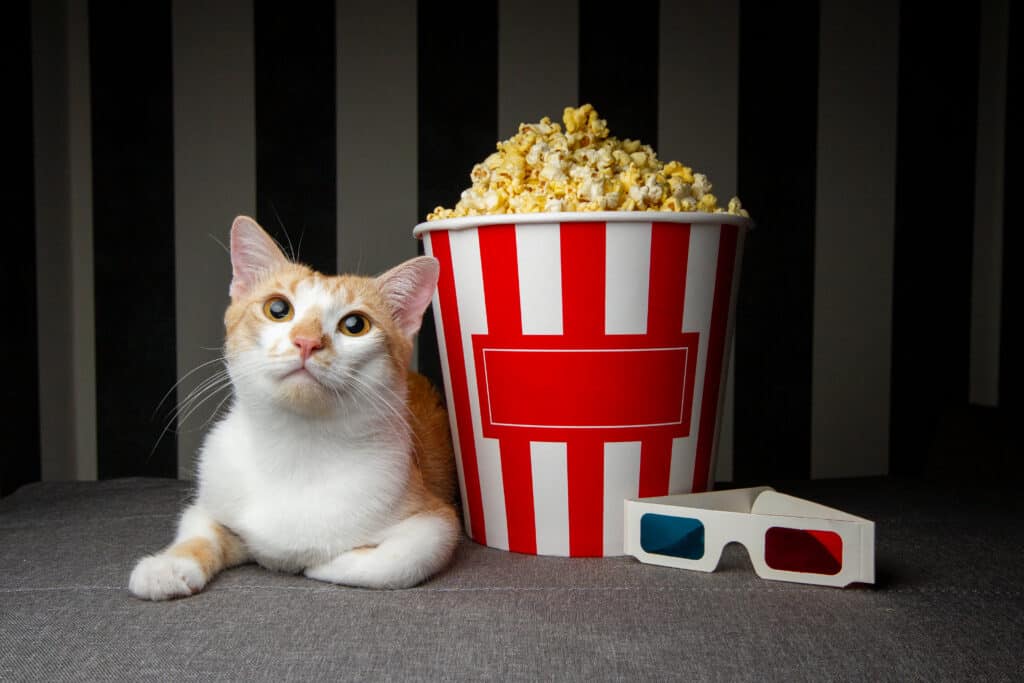
Processed foods such as popcorn are bad for cats.
©Bohdan Malitskiy/Shutterstock.com
Processed human foods shouldn’t be fed to cats. This includes corn chips, tortillas, popcorn, corn dogs, and more.
Foods like this are often high in salt or sugar, or they contain foods that are unsafe for cats. For instance, popcorn kernels can pose a choking hazard. Many common spices are toxic to cats as well.
#6: How to Serve Corn to Your Cat
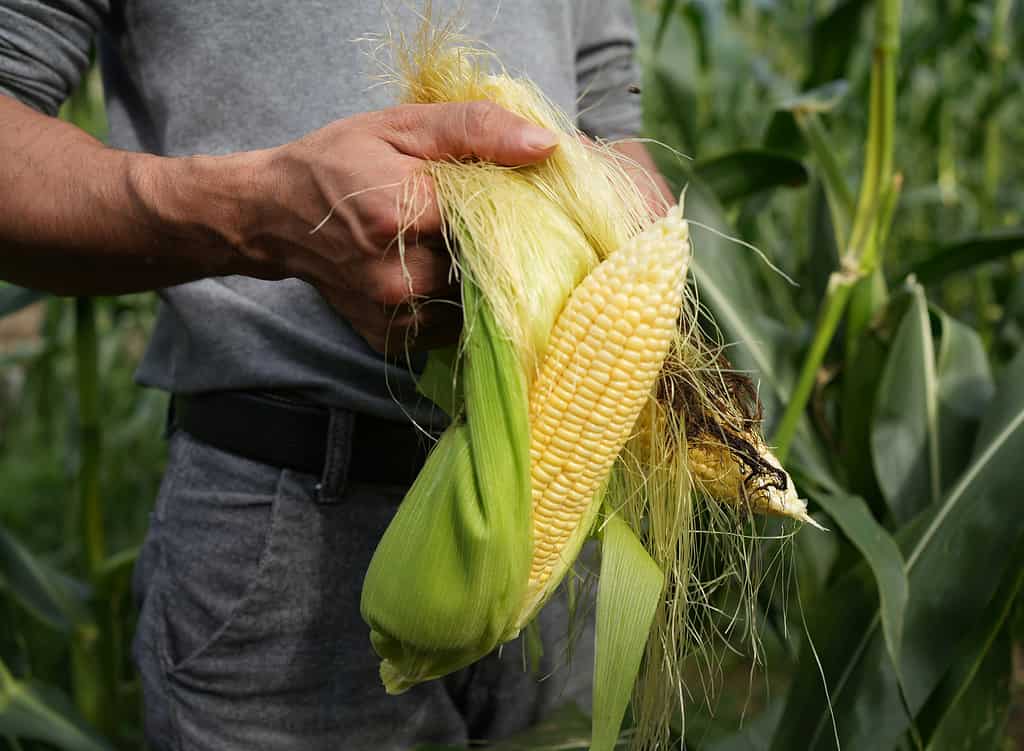
Plain corn without butter, salt, or other seasonings is best for cats.
©iStock.com/Qin PinLi
As we discussed above, most cats already eat corn daily in their cat food. So, this is the first way to serve it to them regularly.
If you’d like to serve corn as a treat, though, here’s how:
- Purchase unsalted canned or fresh corn
- Boil the corn until thoroughly cooked or serve it raw–don’t add salt, butter, or other seasonings
- Remove corn from the cob if needed
- Feed your cat a small number of corn kernels
Remember that moderation is key with any food, but don’t worry too much since corn is already a staple in their diet. It’s unlikely that corn will be new to your cat or cause digestive upset unless fed in high amounts.
#7: Corn is a Rare Allergen for Cats
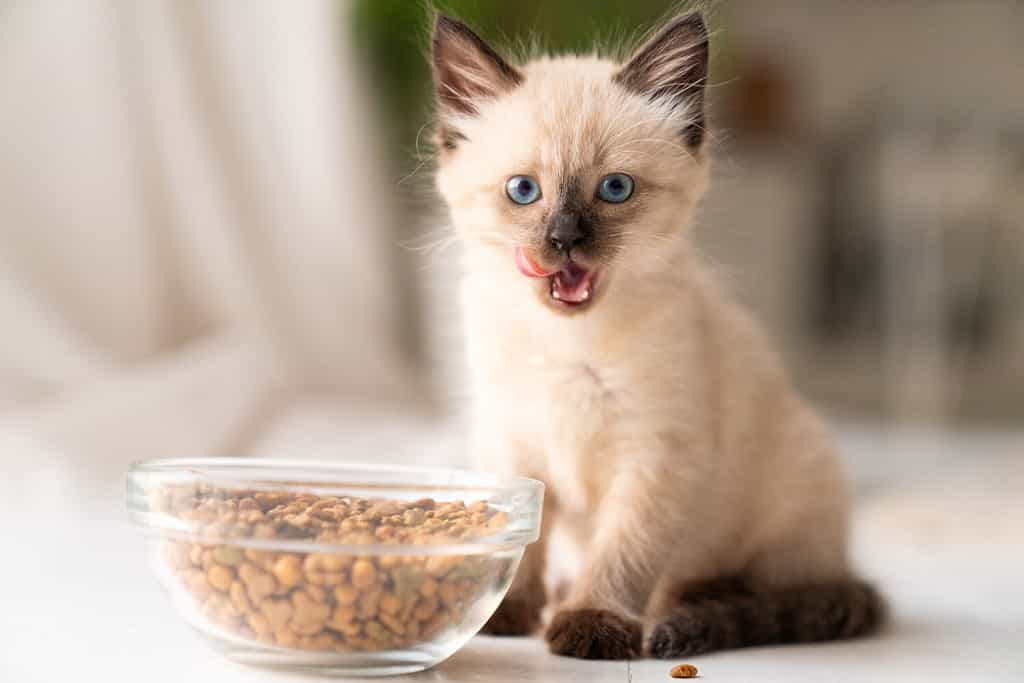
Cats are more often allergic to meat products than grains.
©Yarkovoy/Shutterstock.com
Some cats are allergic to corn and other grains, but this is actually fairly uncommon. The most common allergens for cats are meats.
Unless your cat shows symptoms of a grain allergy, you don’t need to worry about this. If they are allergic to their everyday cat food, then the protein ingredients, such as chicken, might actually be the culprit.
Talk to your veterinarian about how you should move forward to figure out what your cat is allergic to and how you can help.
Of course, if your cat is allergic to corn, you should stop feeding it to them and find alternative food and treats.
#8: Cats and Grain-Free Food
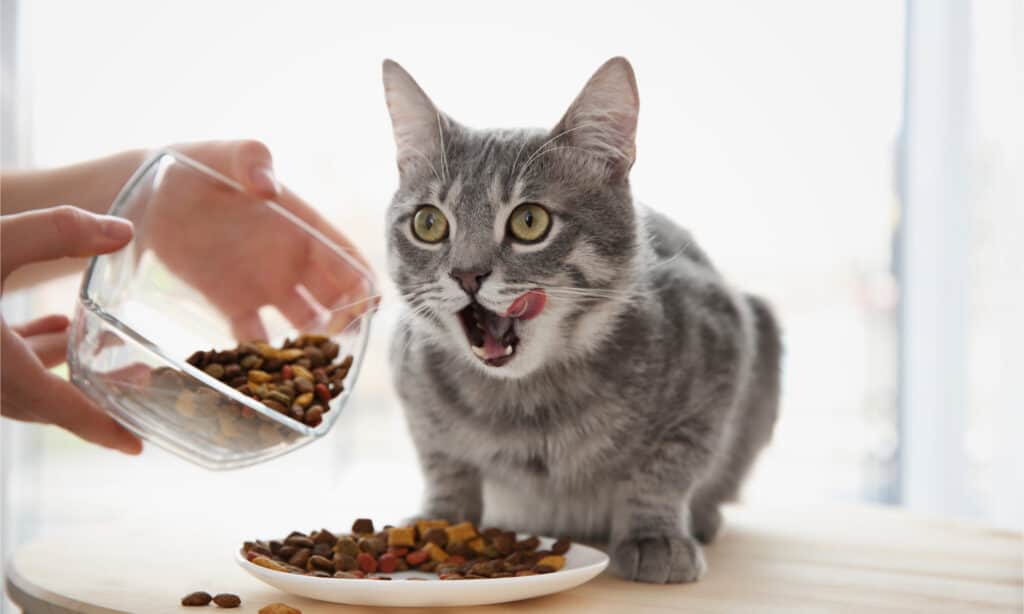
Grain-free food may cause health problems in cats.
©Africa Studio/Shutterstock.com
While cats are obligate carnivores, there’s no proof that corn or other grains hurt them in any way. Although grain-free diets have grown in popularity, you may want to avoid this trend due to the link between heart disease and grain-free diets for dogs. More information is needed to ensure it won’t hurt our cats as well.
VCA Animal Hospital notes that replacements for grains in cat food can contain less fiber and cause digestive issues. Grains like corn also contain needed nutrients for cats, and without them, your cat may develop nutritional deficiencies.
#9: Cats Not Digesting Corn is a Myth
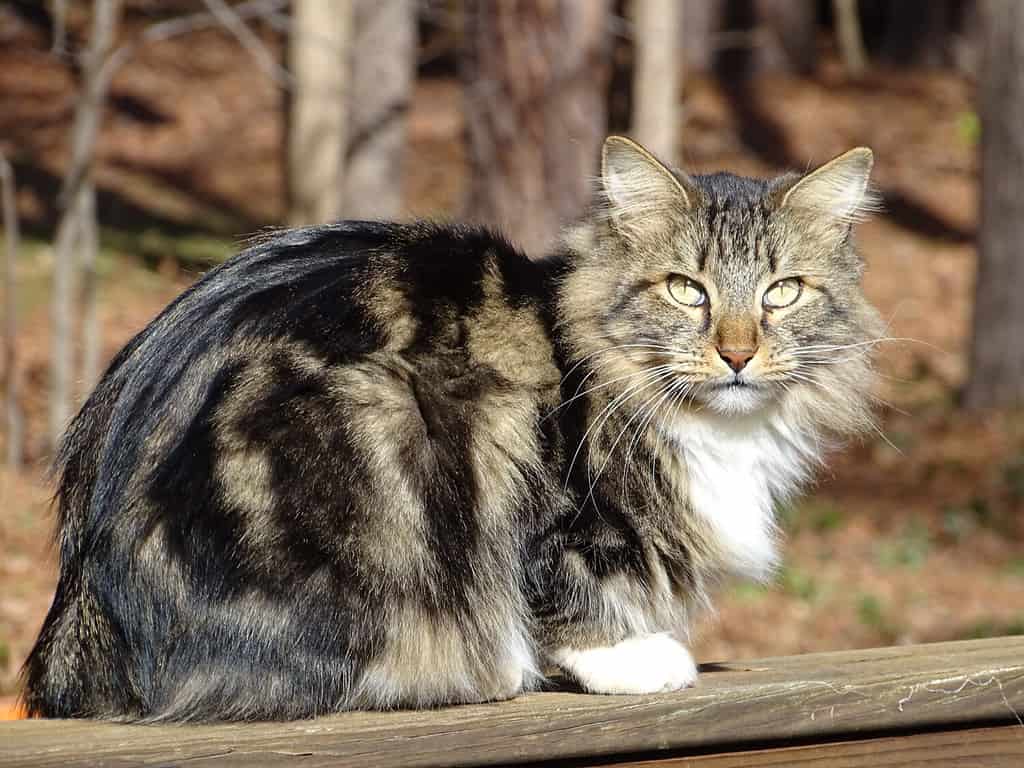
Cats can absorb nutrients from corn, and it’s a healthy addition to most cats’ diets.
©Mary McDonald/Shutterstock.com
Cats can digest corn and absorb nutrients from it and other grains. Some people claim that cats cannot process plant ingredients since they’re obligate carnivores, but this is untrue.
Cats are obligate carnivores, and a stray cat would be very unlikely to munch on corn in a field! It’s also true that cats process nutrients from meat more easily than from grains, but this doesn’t mean they don’t process the nutrients from grains at all.
Corn and other grains are safe and nutritious ingredients in cat foods. In fact, we’re currently seeing more science to support the dangers of grain-free foods than the other way around!
Thank you for reading! If you have feedback on this post, please contact the AZ Animals editorial team.
The photo featured at the top of this post is © osobystist/Shutterstock.com
Thank you for reading! Have some feedback for us? Contact the AZ Animals editorial team.






